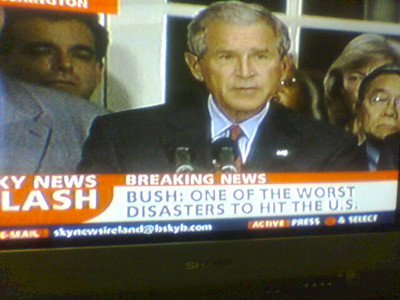On Tuesday
I wrote about the
Washington Post’s failure to fact-check a false assertion by an unnamed Bush Administration official. The official claimed that as of Saturday, September 3, Louisiana Governor Kathleen Blanco had still not declared a state of emergency, and the Post reported that assertion without qualification, as if it were true. As a quick Google News search (or a call to Blanco's office) would have revealed, the assertion was grossly false; Blanco had in fact declared a state of emergency on Friday, August 26, three days before Hurricane Katrina made landfall over the Gulf Coast (and one day
before President Bush himself declared a state of emergency in Louisiana).
At the time, I thought it was unlikely that anyone at the
Post was intentionally passing on Bushist spin, and instead attributed the lapse to pure laziness. For one thing, unless we assume that the reporters and their editors knew that source’s claim was false, there had to have been
some laziness involved in their failure to confirm it before publishing it. But on further reflection I wonder whether the reporters had some reason to persuade themselves it wasn’t necessary to check the claim: they trusted
Karl Rove their source; they were trying to curry favor with
Rove their source; or perhaps they were even in sympathy with
Rove’s their source’s attempt to deflect blame from the White House. Something like that.
Why am I rethinking this at this point? Simple: I’ve seen another Katrina-related Post
article that seems to have been ghost-written by a right-wing spin artist. Here are the opening two paragraphs:
The raging debate over what happened after Hurricane Katrina hit New Orleans and the Gulf Coast has provided Sen. Hillary Rodham Clinton (N.Y.) an opportunity to emerge as a national spokeswoman for the Democratic Party, stirring Republican criticism that she and other Democrats are seeking political gain at a moment of national crisis.
Clinton has long maintained that she is focused solely on serving the interests of her New York constituents. But she was on all three network morning shows yesterday to promote her call for returning the Federal Emergency Management Agency (FEMA) to independent status, and for creating an independent commission to investigate what went wrong when the storm hit and the levees gave way in New Orleans.
So, first, Clinton is a brazen opportunist, taking advantage the debate over the aftermath of Katrina to further her own political ambitions "to emerge as a national spokeswoman for the Democratic Party".
To emerge as a national spokeswoman for the Democratic Party? As Media Matters
points out, this is pure Republican spin:
She is a former First Lady; is a senator from the nation's third-most populous state; has had prominent speaking roles at the last four Democratic National Conventions; and heads the Senate Democratic Steering Committee. Polls have found her to be the most admired woman in America. She hardly needs an "opportunity to emerge as a national spokeswoman."
Second, Clinton’s media appearances calling for an independent FEMA and a commission to investigate what went wrong in the response to Katrina somehow contradict her stated commitment to serve the interest of her constituents. How? The
Post doesn’t say, but again the implication is that Clinton is using Katrina to muscle her way onto the national stage when, to be consistent, she really should be quietly tending her own garden in New York.
In fact, all the contradiction here belongs to the
Post, not to Clinton. Readers who read only the first few paragraphs of the article will have missed this perfectly reasonable explanation for Clinton’s outspoken interest in FEMA, which doesn’t appear until paragraph 12 (of 16):
One Clinton adviser said the New York senator has chosen to speak out so forcefully in large part because of her longstanding opposition to the shift of FEMA into the Department of Homeland Security, and because of her concerns that an ill-prepared FEMA poses problems for her constituents in a state regarded as a prime target of terrorist attacks.
Wow. Clinton cares about FEMA because
- she represents the state of New York in the U.S. Senate,
- FEMA’s mission is the task of “responding to, planning for, recovering from and mitigating against disasters”, including terrorist attacks, and
- New York is regarded as a prime target of terrorist attacks.
Even then, this reasonable explanation is put in the mouth of an unnamed Clinton advisor, whereas the “but” that contrasts Clinton’s actions with her stated focus on her constituents is in the reporter’s own voice. The advisor
said, in paragraph 12, that her words and actions are perfectly consistent, but the reporter
reports, way up in paragraph 2, that they are not.
Is it just laziness that causes a reporter from the reputedly liberal
Washington Post to write such a biased presentation of Hillary Clinton’s response to Katrina? Is it just that it's easier to go with the flow of Administration spin than to buck it? Perhaps. But it looks worse than that.



